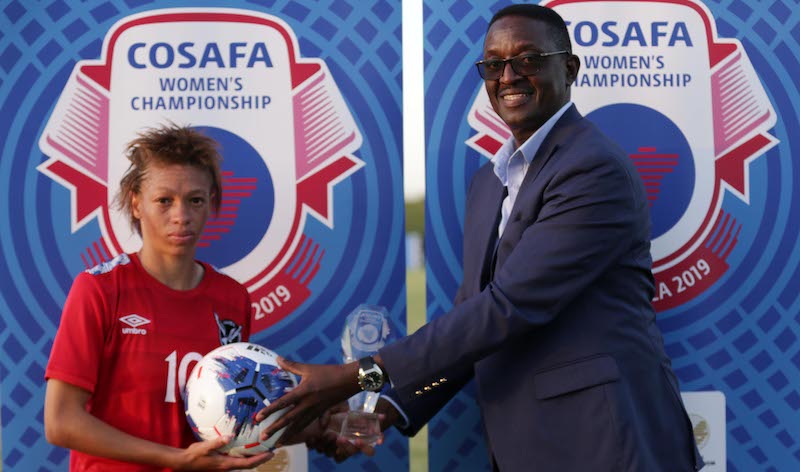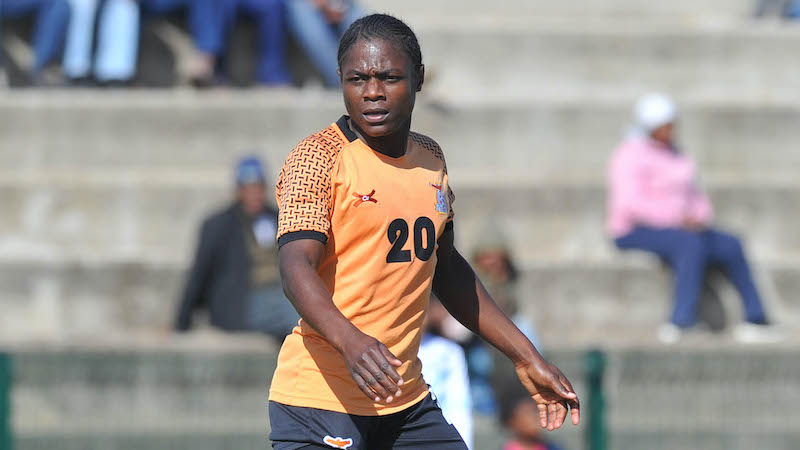The 2021 COSAFA Women’s Championship will be staged in South Africa’s Nelson Mandela Bay from September 15-26 and gives the region’s top female footballers the chance to add them name to the rich history of the showpiece competition.
It has proven a launchpad for many leading stars in the past, some of who will be returning the competition again this year.
Here is a list of past ‘Heroines of the COSAFA Women’s Championship’.
BARBRA BANDA (ZAMBIA)
Banda is only 21 years old but has already left her mark on the COSAFA Women’s Championship in recent years, which helped her win a contract with Spanish side EdF Logroño and more recently Chinese Super League outfit Shanghai Shengli.
Her 18 goals in China last season saw her finish as the leading scorer in the league and cemented her reputation as a top star.
But she has followed that up with a star showing at the 2020 Tokyo Olympics where she scored hat-trick against the Netherlands and China to finish with six goals in a remarkable personal performance.
Banda made her national team debut in 2016 and the following year played the regional showpiece COSAFA Women’s Championship in Zimbabwe, where she led from the front as Zambia topped their first-round pool.
She netted six goals in the competition, including in every game Zambia played, as they finished third and took the bronze medal.
Banda kept up her scoring form with two more goals in 2018 as the Shepolopolo again made the semifinals, but this time finished fourth. Club commitments meant she was absent in 2019, but she returned in 2020 and netted a hat-trick against Lesotho but could not help Zambia past the semifinals.
TABITHA CHAWINGA (MALAWI)
The young Malawian sensation is another of the top players from the Southern Africa region and plies her trade in China with Wuhan Jianghan, alongside sister Temwa, who is also a prolific scorer with the national side.
Still only 25, she has also played in Sweden and finished as the Golden Boot winner in that country in 2015.
Tabitha shone at the 2017 COSAFA Women’s Championship when she scored a hat-trick against Zambia, four goals in a win over Madagascar and another two goals in a Zimbabwe in a remarkable personal haul of nine goals in three games.
She might have got more but Malawi narrowly missed out on the semifinals.
Club commitments meant she did not compete in 2018 and 2019, but she too returned for last year and netted a remarkable six goals against Lesotho and another in the semifinal loss to South Africa.
RUTENDO MAKORE (ZIMBABWE)
Makore (below) has been a leading light for the Zimbabwe side in recent years, including guiding the team to the 2016 Olympic Games in Rio de Janeiro.
She has been prolific in front of goal and was once on the books of Spanish side Sporting Huelva.
She top-scored at the 2017 COSAFA Women’s Championship with 10 goals, including four against Madagascar and three versus Malawi. She netted as well in the final against South Africa, but could not avoid a 2-1 defeat for the Mighty Warriors.
She also netted in the 2018 finals, but Zimbabwe narrowly missed out on the semifinals, pipped at the top of the pool by East Africa guest nation Uganda.
She did not take part in 2019 due to family reasons, but returned to the squad last year. She most recently played for local side Black Rhinos Queens.
NOKO MATLOU (SOUTH AFRICA)
Matlou rose to regional fame in the 2008 COSAFA Women’s Championship finals when she netted 12 goals to take South Africa to the title.
Back then she was a striker and was later named African Women’s Footballer of the Year after some excellent displays for Banyana Banyana.
She is a veteran of five COSAFA finals, although more latterly she plays as a central defender, including at the 2019 FIFA Women’s World Cup in France.
She added to her 2008 COSAFA title with wins in 2017, 2018 and 2019 for Banyana, and remains a key part of the national team though she missed out on the 2020 tournament.
That was because she has signed a professional contract with Spanish top-flight side Eibar, where she excelled last season and will remain for the 2021-22 campaign.
RACHEAL NACHULA (ZAMBIA)
The former sprinter-turned-footballer uses all of her pace to outstrip defenders and is a prolific scorer for the Zambia national side.
Nachula (below) netted 10 times in 2019 on her way to helping the Shepolopolo to the silver medal, and proved the most lethal forward on display in the competition.
That form has helped her win a move to Spanish side Zaragoza CFF, who compete in the second tier in that country, though it will surely not be long before she earns a place in the top-flight.
Club commitments meant she did not travel for the 2020 COSAFA Women’s Championship, while she also missed out on the recent Olympics due to a hamstring injury. She had competed at the Beijing Games in 2008 as a 400-metre sprinter!
ZENATHA COLEMAN (NAMIBIA)
Coleman has been a regular for Namibia at the COSAFA Women’s Championship down the years and is one of the most accomplished footballers to have come out of the southern African region.
The midfielder recently signed a new two-year contract with Spanish side Sevilla, having also previously turned out for Zaragoza and Valencia in that country, as well as Gintra Universitetas in Lithuania.
She is very much the heart-beat of the Namibia side and showed that in 2019 when her five goals made her among the leading scorers in the competition.
Namibia did not take part in 2020 but are back for this year, though club commitments might keep Coleman out of the squad.
VERONICA PHEWA (SOUTH AFRICA)
Phewa holds the record for the most goals in a single COSAFA Women’s Championship when she scored an incredible 15 in the 2002 finals.
That included eight goals in the 14-0 win over Botswana, and another four as Banyana Banyana beat Mozambique 13-0.
Phewa netted in every game that year as Banyana beat Zimbabwe 2-1 in the final, as she opened the scoring in the first half of the decider.
She scored two more times in the 2006 finals as South Africa retained their title, and had an excellent club career in England, the United States and Ukraine.
Her time overseas meant she did not feature at the 2008 COSAFA finals, and she stopped playing regularly for the national team the following year, though did later return.



